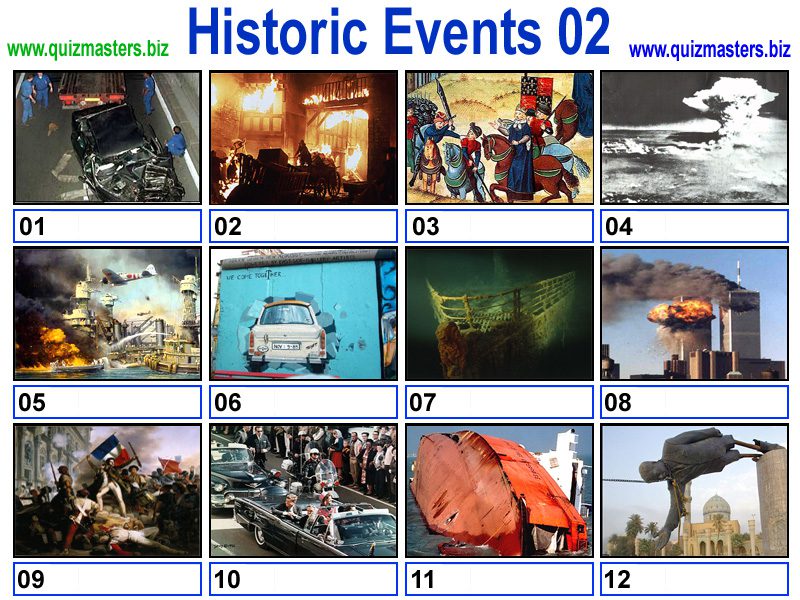This article explores the top ten most important historical events in the world, which greatly impacted human civilization. Starting with the invention of the wheel in 3500 BC and the birth of Jesus Christ, these events include the French Revolution, Industrial Revolution, World War I and II, the women’s suffrage movement, the Cold War, the civil rights movement, and the internet revolution. These events have influenced the world socially, culturally, politically, and economically, and their impact is still felt today. Despite their positive and negative consequences, these events have shaped the modern world, and their significance is likely to continue into the future.
10 Most Important Historical Events in the World
Human civilization has witnessed numerous events that have changed the course of history. Some events have accelerated the pace of development, while others have led to disaster and devastation. Here are the top 10 most important historical events in the world that have significantly impacted human life.
1. Invention of the Wheel
The invention of the wheel in 3500 BC marked a turning point in human civilization. The wheel revolutionized transportation and allowed people to move heavy loads across long distances. It paved the way for the development of other technologies such as carts, wagons, and chariots. The wheel also played a significant role in agricultural development, allowing people to plow fields and increase crop yields.
2. Birth of Jesus Christ
The birth of Jesus Christ in 4 BC marked the beginning of Christianity, a religion that would eventually spread across the world. Christianity has played a significant role in shaping Western civilization, and its values of love and compassion have influenced millions of people throughout history. The teachings of Jesus Christ have also inspired many social and political movements, including the civil rights movement in the United States.
3. The French Revolution
The French Revolution of 1789 saw the overthrow of the absolute monarchy in France and the establishment of a republic. The revolution marked the end of the feudal system and the beginning of the modern era. It also inspired other revolutionary movements across Europe and beyond, including the Haitian Revolution and the Latin American Wars of Independence. The French Revolution’s ideals of liberty, equality, and fraternity continue to influence political discourse and social movements.
4. Industrial Revolution
The Industrial Revolution, which began in the 18th century, marked a significant shift in human history. It saw the development of new technologies, including the steam engine and the cotton gin, which revolutionized manufacturing and transportation. The Industrial Revolution also led to urbanization, as people moved from rural areas to cities to seek work in factories. This period had significant social and economic consequences, shaping the modern world as we know it.
5. World War I
World War I, which lasted from 1914 to 1918, was one of the most significant events of the 20th century. It led to the deaths of millions of people and marked the end of the European empires. The war also saw the rise of new technologies and tactics of warfare, including the use of tanks, chemical weapons, and trench warfare. World War I had significant political and social consequences, including the Russian Revolution and the Treaty of Versailles, which led to World War II.
6. Women’s Suffrage Movement
The women’s suffrage movement, which aimed to secure voting rights for women, was a significant social movement that took place during the late 19th and early 20th centuries. The movement led to the passage of the 19th Amendment to the U.S. Constitution, which granted women the right to vote in 1920. The women’s suffrage movement inspired other social and political movements, including the civil rights movement and the LGBTQ+ rights movement.
7. World War II
World War II, which lasted from 1939 to 1945, was the deadliest conflict in human history. It saw the deaths of millions of people and the use of atomic bombs for the first time. The war led to the rise of the United States and the Soviet Union as global superpowers and the beginning of the Cold War. World War II also had significant social and economic consequences, including the Holocaust and the formation of the United Nations.
8. Cold War
The Cold War, which lasted from the end of World War II to the early 1990s, was a significant geopolitical event that shaped the world’s political landscape. The competition between the United States and the Soviet Union led to the arms race, space race, and the Cuban Missile Crisis. The Cold War had a significant impact on social and cultural development, as it led to the rise of counterculture movements, anti-war protests, and the feminist movement.
9. Civil Rights Movement
The civil rights movement, which took place during the 1950s and 1960s, aimed to secure equal rights for African Americans in the United States. The movement led to the passage of landmark legislation, including the Civil Rights Act of 1964 and the Voting Rights Act of 1965. The civil rights movement inspired other social movements, including the women’s rights movement and the LGBTQ+ rights movement.
10. Internet Revolution
The invention of the internet in the late 20th century revolutionized communication and information dissemination. The internet has transformed the way people live and work, connecting people across the globe and creating new opportunities for business and education. The internet has also led to the rise of new industries, such as social media and e-commerce. The internet revolution continues to shape the modern world, and its impact is likely to grow in the coming years.
Conclusion
These events have had a significant impact on the course of human history, shaping the way we live, work, and interact with each other. While some events have had positive consequences, others have led to tragedy and suffering. Nevertheless, these events have played a crucial role in shaping the modern world, and their impact is likely to continue for centuries to come.
